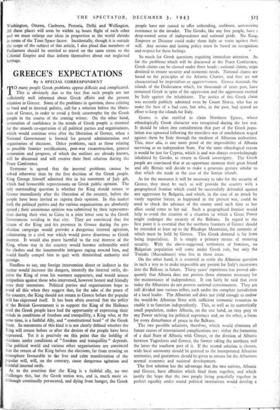GREECE'S EXPECTATIONS
By A SPECIAL CORRESPONDENT
TO many people Greek problems appear difficult and complicated. This is obviously due to the fact that such people arc not sufficiently well informed about Greek affairs and the present situation in Greece. Some of the problems in question, those relating to food and to internal politics, call for a solution before the libera- tion of Greece, in order to avoid a fresh catastrophe for the Greek people in the course of the coming winter. On the other hand, restoration of confidence in the minds of Greek people is essential for the smooth- co-operation of all political parties and organisations, which would continue even after the liberation of Greece, when a National Government is formed for general administration and organisation of elections. Other problems, such as those relating to possible frontier rectifications, post-war reconstruction, general restoration and progress, of which the outlines are already known, will be discussed and will receive their final solution during the Peace Conference.
Everyone is agreed that the internal problems cannot be
sokred otherwise than by the free decision of the Greek people. King George himself admitted this in his statement of July 4th, which had favourable repercussions on Greek public opinion. The only outstanding- question is whether the King should return to Greece immediately after the liberation of the country, before the people have been invited to express their opinion. In this matter both the political parties-and the various organisations are absolutely agreed ; their unanimous opinion was submitted by their representa- tives during their visit to Cairo in - a joint letter sent to the Greek Government residing in that city. They are convinced that the return of the King and his presence in Greece during the pre- election campaign would provoke a dangerous internal agitation, culminating in a civil war which would prove disastrous to Greek interest. It would also prove harmful to the real interest of the King, whose stay in the country would become unbearable amid the clashes and the innumerable intrigues raging around him, and would finally compel him to quit with diminished authority and prestige.
Needless to say, any foreign intervention direct or indirect in the
matter would increase the dangers, intensify the internal strife, de- prive the King of even his warmest supporters, and would arouse antipathies against those who intervened, however honest and friendly were their intentions. Political parties and organisations hope to avoid all this when they suggest that, for the sake of the peace of the country, the King should not return to Greece before the popular will has expressed itself. It has been often asserted that the policy of the British Government is to support the King of the Hellenes until the Greek people have had the opportunity of expressing their minds in conditions of freedom and tranquillity, a King who, at the same time, is a faithful Ally, and " constitutional head " of the Greek State. In statements of this kind it is not clearly defined whether the King will return before or after the desires of the people have been expressed. Yet it is precisely on this point that the holding of elections under conditions of "freedom and tranquillity" depends. The political world and various other organisations are convinced that the return of the King before the elections, far from creating an atmosphere favourable to the free and calm manifestation of the popular will, will, on the contrary, cause dangerous agitation and
harmful internal strife.
As to the assertion that the King is a faithful ally, no one challenges this, but the Greek- nation was, and is, much more so. Although`continually persecuted, and dying from hunger, the Greek
people have not ceased to offer unbending, stubborn, unwavering resistance to the invader. The Greeks, like any free people, have a deep-rooted sense of independence and national pride. No King, Emperor or Dictator could make them fight or resist against their will. Any serious and lasting policy must be based on recognition and respect for these feelings.
So much for Greek questions requiring immediate attention. As for the problems which will be discussed at the Peace Conference, Greek claims can be classed under three heads ; national claims, steps destined to ensure security and economic needs. National claims are based on the principles of the Atlantic Charter, and they are not characterised by imperialism or aggressiveness. Greece demands the islands of the Dodecanese which, for thousands of years past, have remained Greek in spite of the oppression and the aggression exerted by Italy against the inhabitants. The justice of this Greek claim was recently publicly admitted even by Count Sforza, who has to make the best of a bad case, but who, in the past, had spared no effort to keep the islands for Italy.
Greece is also entitled to claim Northern Epirus, whose ethnologically Greek character was recognised during the last war. It should be taken into consideration that part of the Greek popu- lation was uprooted following the merciless war of annihilation waged against them by Italy through the medium of Albanian authorities. This, inter alia, is one more proof of the impossibility of Albania surviving as an independent State. For the same ethnological reason it would be just for Cyprus, which is and was always overwhelmingly inhabited by Greeks, to return to Greek sovereignty. The Greek people are convinced that at an opportune moment their great friend and ally Britain will decide to make a generous gesture similar to that which she made in the case of the Ionian islands.
As for the measures it will be necessary to take for the security of Greece, they must be such as will provide the country with a geographical frontier which could be successfully defended against any aggression by Bulgaria, and which, in the case of an attack by vastly superior forces, as happened in the present war, could be used to check the advance of the enemy until such time as her allies could come to her aid. Such a geographical frontier would help to avoid the creation of a situation in which a Great Power might endanger the security of the Balkans. In regard to the first point it is essential that the northern frontiers of Greece should be extended at least up to the Rhodope Mountains, the summits of which must be held by Greece. This Greek demand is far from being imperialistic. It is simply a primary means of ensuring security. With the above-suggested settlement of frontiers, no Bulgarian population will come under Greek rule, but only the Tomaks (Mussulmans) who live in those areas.
On the other hand, it is essential to settle the Albanian question in such a way as to make impossible any pretext for Italy's incursions into the Balkans in future. Thirty years' experience has proved ade- quately that Albania does not possess those elements necessary for the maintenance of independence. It can fairly be said that even today the Albanians do not possess national consciousness. They are still divided into various tribes, each under the complete jurisdiction of a local leader. The Albanian soil does not yield enough to endow the would-be Albanian State with sufficient economic resources to enable it to function independently. This, as well as its numerically small population, makes Albania, on the one hand, an easy prey to any Power striving for political supremacy and, on the other, a focus for every disturbance of peace in the Balkans.
The two possible solutions, therefore, which would eliminate all future causes of international complications are : either the formation of a dual State of Albania with Greece, or the division of Albania between Yugoslavia and Greece, the former taking the northern and the latter the southern part of it. If the second solution is chosen, wide local autonomy should be granted to the incorporated Albanian territories, and guarantees should be given to ensure for the Albanians normal economic and national development.
The first solution has the advantage that the two nations, Albania and Greece, have affinities which bind them together, and which justify the hope that the two people living peacefully together in perfect equality under sound political institutions would develop a
common and homogeneous national consciousness. The validity of this hope is proved by the fact that many prominent Greek politicians —such as Admiral Kountouriotes and General Pangalos, both ex- Presidents of the Greek Republic—were, some generations back, of Albanian origin, and still speak both languages. Both these men were strongly conscious of their Greek nationality, but spoke Albanian as well as Greek. The case is the same with the late Vice-Premier of the Greek Government, E. Repoules, and very many others, like Coletes and Voulgaris, who were all important figures in Greek politics. If the formation of a Greco-Albanian dual State meets with difficulties and objections, the only remaining solution is the in- corporation of the northern part of Albania in Yugoslavia and of the southern in Greece.



























 Previous page
Previous page